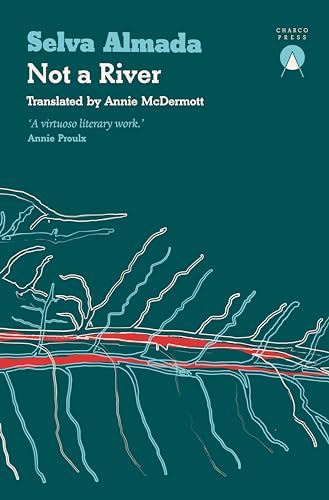What do you think?
Rate this book


92 pages, Kindle Edition
First published January 1, 2020
‘This man isn’t from these woods and the woods are well aware. But they leave him be. He can come in, he can stay for as long as it takes to gather kindling. Then the woods themselves will spit him out, his arms full of branches, back to the shore’
‘I was seeking to piece together a language that was earthy and colloquial, as natural as breathing, and could plausibly feel like the way people might speak on this island in the Paraná Delta.’
‘It wasn't a ray. It was that ray. A beautiful creature stretched out in the mud at the bottom, she'd have shone white like a bride in the lightless depths. Flat on the riverbed or gliding in her tulle, magnolia from the water, searching for food, chasing transparent larvae, skeletal roots.The hooks buried in her sides, the tug-of-war all afternoon till she can't tight any more. The gunshots. Pulled from the river to be thrown back in later.
Dead.’

"Cuando empecé El viento que arrasa no sabía que iban a seguir estas dos novelas, de hecho cuando escribí Ladrilleros tampoco lo sabía. Pero cuando aparecieron las primeras imágenes de esta novela pensé que entre las tres podían formar una especie de trilogía porque están concentradas en personajes masculinos y en el universo de los varones."
(translated per ChatGPT) "When I started 'El viento que arrasa,' I didn't know that these two novels would follow; in fact, when I wrote 'Ladrilleros,' I didn't know either. But when the first images of this novel appeared, I thought that the three could form a kind of trilogy because they are focused on male characters and the universe of men."
"Enero Ray, standing firm on the boat, stocky and beardless, swollen-bellied, legs astride, stares hard at the surface of the river and waits, revolver in hand."
Siomara was in one of those phases she sometimes went through, when she was grouchier than usual. Saying no to everything and dealing out punishments and bans for no reason. All because she could see how the two girls were growing, how little by little they were slipping away, how sooner or later they were going to leave her as well.
Sometimes she thinks the fire talks to her. Not like a person does, not with words. But there's something in the crackle, the soft sound of the flames, as if she could almost hear the air burning away, yes, something, right there, that speaks to her alone...
Come on, you know you want to.
It says.
Lucy wants to be a hairdresser. She wants to give other woman those moments of peace her mother seems to feel when she is doing her hair.
A summer like this one. Twenty years back, a summer like this one. The same island or the next one along or the one after that. In the memory it's all just the island, with no name or exact coordinates.
Eusubio looked at him and thought for a moment.
We need to go see my godfather. He knows about this stuff.
He said.
And what happened in the dream?
I don't know, like I say I just had a kind of flashback. It was weird, there were lights and sirens.
She pretends not to hear. Still just about strong enough to resist. But for how much longer.
One day, she knows she will answer the fires's call.
The characters in my novel, men and women who live on what the river can provide, are a reflection of what the neo-liberalism of the 1990s has done to Argentina: impoverishing it, condemning a significant part of its citizens to poverty and marginalization.Selva Almada

Aguirre shakes his head.
Instead he says.
You know those guys who caught the ray.
Beautiful specimen.
Says César, though he never saw it, just heard.
They fucking chucked it away, can you believe?
Suddenly everything stops. The dealer pauses mid-shuffle. The drinkers put down their cups. Everyone looks at him.
They chucked it in the river?
Says Aguirre.
Motherfuckers!
Says César.
We need to teach them a lesson.
Says Aguirre.
What kind of a lesson?
Says César.

(...) no es un río, es este río (...)
Entonces.
¡Quién les dio permiso!
No era una raya. Era esa raya. Una bicha hermosa desplegada en el barro del fondo, habrá brillado blanca como una novia en la profundidad sin luz. Echada en el limo o planeando con tules, magnolia del agua, buscando comida, persiguiendo las trasparencias de las larvas, las esqueléticas raíces. Los anzuelos enganchados en sus bordes, el tironeo de toda la tarde hasta darse por vencida. Los tiros. Arrancada al río para devolvérsela después.
Muerta.